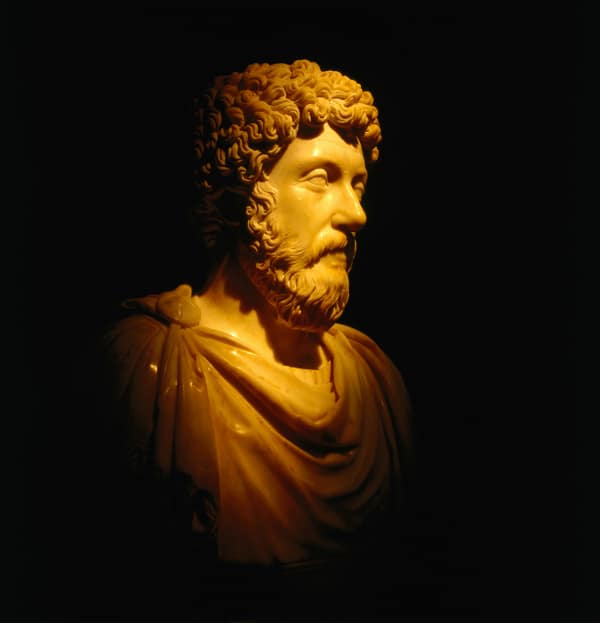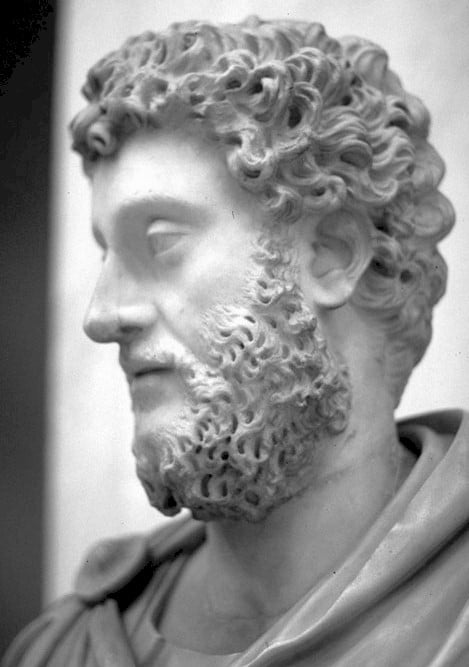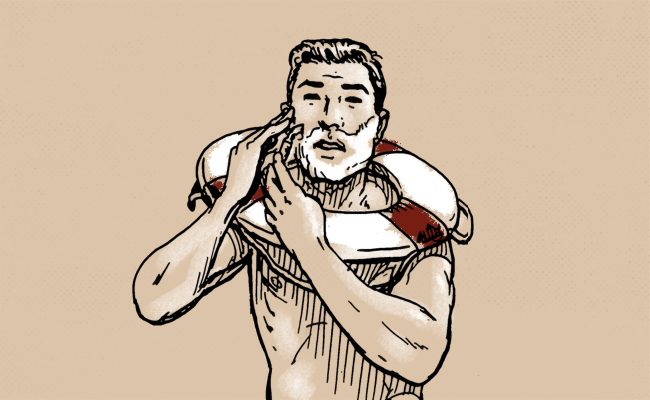While Stoicism is an ancient philosophy, it’s experiencing a bit of a resurgence in our modern world. There’s a plethora of new books and articles on the topic, most of them quoting what’s taken to be the Stoic bible: Marcus Aurelius’ Meditations.
Much of what’s written about Stoicism these days, though, assumes that the reader has already engaged with that classic text. I recently realized that diving into the new How to Be a Stoic or any of Ryan Holiday’s well-known books was fairly worthless without having first read Aurelius.
So I decided to finally read the little volume and keep a journal of sorts of my own meditations while reading Meditations. This isn’t a summary or overview of the book, or of Stoic philosophy. Rather, it’s simply a collection of thoughts and lessons I took from my first reading. While a 100-page book would usually take me maybe 90 minutes to finish, getting through Meditations required a few solid weeks. It’s so jam-packed with wisdom that my brain just couldn’t handle more than a few pages at a time. You’ll understand then why the below article couldn’t possibly cover all that the book has to offer, and I can’t recommend enough picking up a copy for yourself and diving in.
Note: All quotes are from Meditations unless otherwise noted. A variety of translations were used.
1. Every Man Has a Primary Battle
Life is warfare . . . Then what can guide us? Only philosophy.
One of the most important things to understand about Aurelius’ meditations is that they were private writings to himself. Personal reminders on the rules and guidelines for living. A collection of journal entries, really. They didn’t even have the title Meditations until perhaps hundreds of years later. At first, the collection of thoughts and writings were simply known as “the writings of Marcus” or some variation thereof.
Why is this so important? The writings are still chock-full of wisdom that can be broadly applied, aren’t they?
But of course they are! As with all writing, however, context matters.
Marcus Aurelius was a warrior, emperor, father, and husband. As a child, he lost his father when he was just a few years old, and as was common practice for aristocratic families of that era, Marcus was raised largely by mentors, nurses (nannies), and grandparents. When Aurelius became a father himself, he endured the deaths of eight children. All of that leads to the main themes that can be found in Meditations. You’ll see the same topics come up again and again and again.
Why does Aurelius write so much about death? Because he was surrounded by it — his family, his soldiers, his friends. Why does he write so much about not letting other people’s bad actions and attitudes affect you? As an emperor he was dealing with greedy politicians day in and day out, as well as naysaying citizens.
These meditations were written to himself as admonitions about how to think and behave in the midst of his specific environment and his specific struggles.
Aurelius likely battled with keeping a positive attitude in dealing with others. He of course mourned death and needed reminders that it was a natural event that couldn’t be controlled. His Stoicism was a remarkably practical philosophy centered on simply surviving and staying sane in his world.
As David Brooks noted in his fantastic podcast with Brett, every man has a primary battle or two in life. Dwight Eisenhower could be viciously angry, but found ways to deal with it. Jack London battled alcoholism, and while it ultimately contributed to his death, he battled through it, and lived a remarkably productive life. It’s quite possible that Marcus Aurelius feared death (not just his, but for his loved ones too) and had a short temper, and so he wrote himself these notes, repeating his themes over and over.
Let this be a lesson that while all humans face universal challenges, each of us has a primary struggle or two in life. Laziness, substance abuse, compulsive lying, over-eating, etc. It could also be things out of your control — the death of a spouse or child, an abusive family, job loss. Whatever your own personal context may be, it would serve you well to do like Marcus and write out meditations and exhortations to yourself as “moral reminders” — pithy ideas to keep you going in the midst of ongoing hardships and struggles.
2. Every Man Should Take Lessons from Everyone Around Him
From my grandfather Verus I learned good morals and the government of my temper.
From the reputation and remembrance of my father, modesty and a manly character.From my mother piety and beneficence . . .
Meditations starts out with Aurelius listing lessons he’s learned from various people in his life. From his governor, “to work with my own hands,” from Rusticus (one of his teachers) “to read carefully, and not to be satisfied with a superficial understanding of a book,” and of course various character traits from his family members, as seen in the quote above.
Surely, not all of Aurelius’ mentors were perfect. And how do I know this? Because nobody is! Among his list of seventeen people in the opening chapter there was likely common character flaws like selfishness, jealousy, and anger, as well as rank betrayals and outright crime. Aurelius was wise enough to know, though, that there are lessons to be learned from everyone around us. A failing, even multiple failings, doesn’t negate someone’s ability to have a positive impact on your life.
Our modern culture, however, has forgotten this ancient lesson. A moral failing by a modern business person, celebrity, politician, or even a company sparks internet outrage and calls for boycotts. Behaviors of historical figures now judged to be offensive, even if common to the time in which the men lived, are enough to write off all of their other admirable virtues and worthy accomplishments.
We don’t write ourselves off despite our flaws. Likewise, the wisest of men know that every person is a mosaic of virtue and vice, and that wisdom can be found in everyone, if only you’re willing to look.
3. Fate Plays a Role in Every Man’s Life — You Can Either Fight It or Accept It
To the gods I am indebted for having good grandfathers, good parents, a good sister, good teachers, good associates, good kinsmen and friends, nearly everything good.
For all these [blessings in my life] require the help of the gods and fortune.
As Isaac Lidsky has said, accept that life is a game of poker. While there are certain things you can do to increase your odds of winning, a large part of each hand is completely out of your control. Would you fight the cards dealt in a given hand, arguing that it’s not fair or that you want a re-shuffle? Of course not. While life is certainly higher stakes than poker, you just have to accept that what happens, happens. Even with death.
You can either double down and try to gain a greater grip of control (and lose much in the process), or you can know that whatever randomness and complexity life throws your way can be an opportunity to learn, grow, and build your resilience, even if the hand you’ve been dealt is pretty crappy. Sometimes even a 7-2 — statistically the worst starting hand in poker — wins out every once in a while.
4. A Man is Not to Be Consumed by the Actions and Attitudes of Others
“When you wake up in the morning, tell yourself: The people I deal with today will be meddling, ungrateful, arrogant, dishonest, jealous and surly. . . . none of them can hurt me.”
“Don’t waste the rest of your time here worrying about other people . . . It will keep you from doing anything useful.”
“Why do you not rather act than complain?”
How much of your day is spent complaining — either out loud or silently — about the actions of others? The driver who cut you off. The slow barista. Our deadlocked government. Your crank boss. How much of your energy and time is wasted thinking and stewing about those things?
As Aurelius wisely notes, you cannot be harmed or hurt by any of these people unless you allow it. Your life is wasted in choosing to be guided by the thoughts and actions of others.
We aren’t in control of the events that play out around us. But we are in control of our own attitude and responses to those events. It’s really that simple.
Viktor Frankl clung to this idea when he was imprisoned at both Auschwitz and Dachau during the Holocaust. He said: “The one thing you can’t take away from me is the way I choose to respond to what you do to me. The last of one’s freedoms is to choose one’s attitude in any given circumstance.”
5. Strenuous Action is the Answer
“When thou hast trouble in getting up, say to thyself: I awake to do the work of a man; why then should I grieve for having to do the things for which I was sent into the world? Was I born to remain warmly in bed under my covers? But it is so pleasant. Wert thou born for pleasure, then? Was it not for action, for work?”
“On the occasion of every act ask yourself . . . Will I regret it?”
“Why were you born? For pleasure? See if that answer will stand up to questioning.”
As Kyle Eschenroeder rightly notes in his Pocket Guide to Action, action is indeed the answer. I would add to that the notion of strenuousity as well.
The catchphrase of The Strenuous Life is “Do Hard Things.” The point being that hard things — learning new skills, pushing yourself physically and mentally, serving others — is far more inherently fulfilling and satisfying than leading an easy, climate-controlled, smartphone-saturated lifestyle.
In the last year or so, my own little family has adopted that motto as well. As parents to a toddler, my wife and I have noticed that a lot of other parents complain about losing their old lifestyle. They miss going out to eat, traveling, hanging out with friends, and in general, doing adventurous things. What we’ve also noticed is that missing out on those things is mostly self-imposed. Sure, it’s far more difficult taking a hike with kids than staying in and watching cartoons, and it requires more mental energy and willpower than you’d expect. But what my wife and I have noticed in every single instance is that it’s better to get outside on an adventure than stay at home. Even when (when, not if — this is not a hypothetical example) your toddler screams his way down the mountain and you have to sing Taylor Swift to keep him remotely happy. It’s still worth it.
While Aurelius, in one of the above quotes, seems to be downplaying the value of pleasure, I believe he’s downplaying the value of lazy pleasure. Of lying in bed (or on the couch) all day, drinking and eating to your heart’s content while bingeing on the new season of Hot New Show That Everyone References. There is immense pleasure to be found in partaking in the strenuous life. And because it’s earned, it’s a pleasure that’s far greater than what you’d find simply lying about. I assure you, a good meal and a good beer tastes far better when you’ve first hiked a few miles or lifted a few hundred pounds of iron.
6. A Man Should Think, Do, and Be Good
“While you live, while it is in your power, be good.”
“Consider if you have behaved to all in such a way that this way be said of you: Never has he wronged a man in deed or word.”
“Look within. Within is the foundation of good, and it will ever bubble up, if you will ever dig.”
“No longer talk at all about the kind of man that a good man ought to be, but be such.”
“What is your art? To be good.”
In most instances, we know what it means to do good in our world. Do you return the wallet you found on the ground, even if you could just take it without anyone noticing? Do you help the old woman next to you struggling to get her groceries in the car, even if you’re running a little bit late? Do you attend a funeral to show your support, even though its hundreds of miles away? Should you welcome your new neighbor, even if you know it’ll be a little awkward at first?
We know, inside of us, that the answer to these questions should be yes. But our actions sometimes — even often — differ from what we know to be right. Life just gets in the way. Work beckons, meals need to be prepared, you just need to sit down for a minute.
But, as mentioned above, life is better when we engage in doing hard things. And many times doing and being good is one of those hard things. So how do you make it easier?
As Aurelius advises, “inquire of yourself as soon as you wake from sleep.” Start every morning by getting in a mindset where you’re prepared to look for opportunities to serve and be useful. Benjamin Franklin practiced this, asking himself every morning “What good shall I do this day?” Then, at the end of the day, review your actions and inquire of yourself, as he did, “What good have I done today?” By bookending your day with a meditation on goodness, you will orient your soul more and more towards virtue.
Make your art that of being good. Do not simply think on it or talk about it; do good.
Conclusion
I wrote down the following in my journal immediately after finishing Meditations for the first time:
The general sense of the book seems to be that Marcus Aurelius is imploring himself to live with thoughtfulness and purposefulness of action, because our time on earth is fixed and short and should not be wasted. That doesn’t mean to ignore pleasure, or to ignore pain, but simply not to be overcome or driven by those things.
I ultimately found the exercise of meditating on Meditations to be rather enriching. The insights I gained from reading this ancient work and journaling about its applications to my own modern life have stuck with me. If you’ve never read Meditations before, I encourage you to take a few weeks to study Aurelius’ little volume of philosophy. Keep a notebook close by and write down your reflections on his words, and how you might use them to better engage your own primary struggle, live more strenuously, and do good.
Be sure to listen to our podcast about the life and philosophy of Marcus Aurelius:








